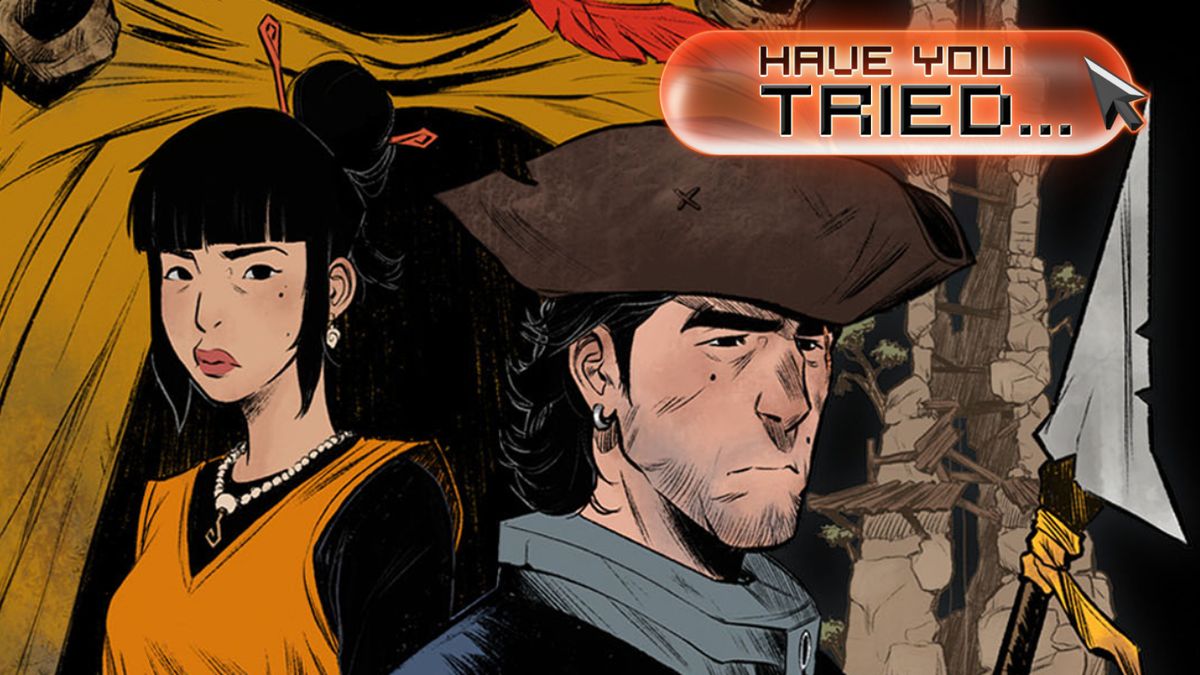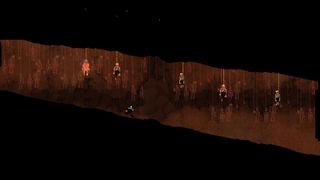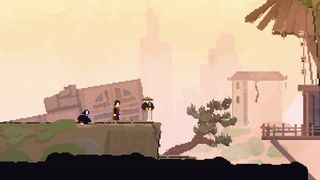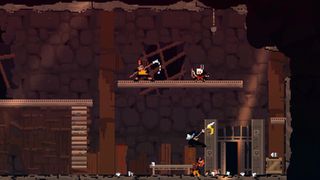
Harpoons don’t get nearly enough love in video games. While everything from Fortnite to Sea Of Thieves deploy them as functional fishing tools, what’s the point of wielding an eight foot harpoon if you can’t even use it to skewer your AI enemies? Thankfully, it seems Kyoto based one man dev Thomas Ollson shares our grievances.
In Devolver Digital’s Olija, our pointy prayers have at last been answered – because in this retro-inspired sidescroller, the almighty harpoon finally takes centre stage.

Home’s where the harpoon is
It’s hard to overstate the harpoon’s importance to Olija, really. Thrust into the hands of our shipwrecked protagonist, Lord Faraday, this once ancient fishing implement becomes not only a suitably badass killing tool but more importantly - a crucial method of transportation. Using a tap of ‘A’ Faraday launches his harpoon across Olija’s eerie environments, with a second press of ‘A’ sending him instantly hurtling through the air after it. It’s a brilliantly satisfying mechanic, allowing the player to speedily skewer themselves into enemies, discover new horizons, and if you’re anything like us – send poor old Faraday flying to his death. Sorry mate.
Much like the alluring off-screen environments in the NES Zelda outings, hurtling fearlessly upwards into the unknown can often land a frowning Faraday in a previously unseen part of the map –rewarding him with a trove of tantalizing treasures. It’s a swift almost Nightcrawler-esque mechanic and one that transforms the genre’s usual sluggish traversal into lightning-fast leaps across levels.
The pursuit of harpooniness
Still, you need a reason to be zipping around holding a harpoon ( or so we’re told), and thankfully, the world Faraday inhabits is as thrilling as his hedonistic harpoon haulage. Upon our protagonist’s aforementioned prologue plummet into the depths of the ocean, the battered settler Lord Faraday suddenly finds his countrymen dead – and himself alone in a strange, unforgiving land. As he attempts to find his way back home, our hero must discover the mysteries that await him in this sinister new land– one pixelized plane at a time.

It’s a setup that sees players discovering this grimdark new world, as they make their way across everything from abandoned temples to fiend-infested forests. Faraday’s new home is a brutal one, with hair-raising sound design and detailed animations bringing the horrors of this gloomy land to life with some intriguing elements of lore littered throughout Olija. Stop us if you’ve heard this all before.
Float like a butterfly, sting like a harpoon
Thankfully, this isn’t the same oldVania. What separates Devolver Digital’s latest from the countless other brooding 2D sidescrollers flooding digital storefronts is Olija’s hugely satisfying combat. Where Metroidvania and spooky settings are, of course, familiar bedfellows, unlike its peers, there is a real weight to combat here. Where many in the genre ape the sluggish and sadistic Dark Souls, Olija delights in giving the player a more snappy and powerful-feeling protagonist. Even in the early game where you’re severely lacking in character upgrades, refreshingly, Faraday is no pushover. Where a single hit in many sidescrollers sees players limply crumpling to their deaths, Olija instead relishes in making you feel like a badass. In fact, for much of its playtime, Olija shares more in common with a Platinum Games-esque power fantasy than say, Hollow Knight.
Sign up to the 12DOVE Newsletter
Weekly digests, tales from the communities you love, and more

Thanks to the game’s altogether more reasonable difficulty, Olija becomes more about getting into a swashbuckling sense of flow than an endless cycle of frustration – resulting in a much shorter adventure than most of its peers. Yet thanks to its genuinely eerie atmosphere, satisfying harpoon mechanics and intriguing world, Olija’s sea-faring voyage is one that’s more than worth taking.
Olija is out now on Nintendo Switch, PC, PS4 and Xbox One.

Tom is a freelance journalist and former PR with over five years worth of experience across copy-writing, on-camera presenting, and journalism.
Named one of the UK games industry’s rising stars by Gamesindustry.biz, Tom has been published by world-leading outlets such as: Fandom, The Guardian, NME, Ars Technica, GamesRadar, Engadget, IGN, Techradar, Red Bull, and EDGE.











